#like being a billionaire goes past being immoral
Text
i ended up googling how many billionaires there are because of this whole fiasco and there are almost three tHOUSAND billionaires. that is what... trillions of dollars being horded. trillions of dollars that could feed people, house people, educate people. trillions of dollars that could be used to make sanctuaries, protect land and animals, make entire swaths of the world just places where the planet can breathe.
two thousand, seven hundred people. that's just... a particularly dense neighborhood. owning enough wealth to save the world and instead spend on killing it and sometimes killing themselves.
that's what people who go "aw, they're still human beings, aren't they?" don't get. to me, this sounds like fucking space invaders who landed on the planet and just stole the entire food supply. that's not a fellow human being, that is a roadblock to fucking survival. that's my enemy and, yes, i cheer when my enemy dies sometimes.
#like being a billionaire goes past being immoral#you aren't human anymore#and YES i understand the harms of dehumanizing people#but listen#they aren't human#you cant be
16K notes
·
View notes
Text
Contextual Research
The reason i am researching heroes and villains mainly is because it is a common story throughout history that gives for a balanced field of play which goes hand in hand with 1v1 the opposites sides of a spectrum to tip the scales toward them similar to concept to ideals like Taoism and Yin-Yang.
Concept of a hero
The concept of a hero in stories are usually the most boring in motive and uncomplex written charters a lot of the time as they are defined to be true and pure good as seen in both DC and MARVEL's headliners with superman and Captain America. Despite this they're heroes that bend the mould of this a lot with different heroes seeming to have different definition of justice.
Concept of a villain
Different types of villains and reasoning behind evil
youtube
Villains in fiction helps us mentally process conflict and morality in real world probably even more than actual philosophers as the certain portrayals can be vast and widely relatable, while maybe not doing objectively good things villains that do elevated demonstrations of reaction to emotion let us discuss that emotion without extremities and work toward preventing the journey that brought a villain to being evil instead of the action itself. Exploring the disease not the symptom.
Concept of an anti hero
The concept of an anti-hero is similar but consequentially different to a sympathetic villain mostly because of their motives. In general terms an anti-hero is someone who regularly fights on the side that presents moral good but their methods are regularly frowned upon or immoral. Usually not very complex characters and apathetic an anti-hero is considered the complete opposite of a sympathetic villains as they act out of selfishness, self-preservation and catharsis for their damaged emotions and past.
Concept of a sympathetic villain
Mr. Freeze
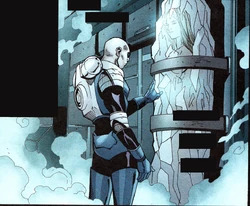
Unlike most DC villains, Mr. Freeze is typically portrayed as a sympathetic anti-villainous character, as, in most versions, his motivation for his crimes are to save his dying wife, Nora Fries. Like a lot of other villains he does quite objectively bad things but it terms of sympathetic villains does the cause always out way the means, and usually when it is to preserve and protect your own family a lot of people would agree yes.
Birdman
Director called superhero films and Hollywood's obsession with them "Cultural Genocide" and complained about them glorifying billionaires and only them being heroes.
Ironman
youtube
Billionaire "Hero" With ego issues and a way of presenting that only capitalism can stop issues as he funds the majority of avenger operations.
Very America-centric outlook on justice however this is challenged in Captain America civil war were the governments want to own superheroes instead of them being a private organisation. While the points raised for the ownership and control over them is good, with superheroes in the MCU having little regard for destruction they cause, a point of diplomatic power defining someone else's actions tampers with a heroes definition due to nature of geopolitics and the massive biases with it.
Spiderman
The very essence of Spiderman contradicts majorly to the point made by Alejandro González Iñárritu the director of birdman due to fact he is written to be part of a broken, impoverished family with no parents, a dead uncle and in some cases of the story having him lost everyone. Despite this he still is the one getting bitten which makes him feel a lot of responsibility to people that are similar to him with him most widely described as a "Friendly neighbourhood Spiderman"
7 Branched sword
The 7 Branched Sword or 칠지도 or Chiljido is a ceremonial sword believed to be a gift from the king of Baekje to a Yamato ruler. It is a 74.9 cm long iron sword with 6 staggered branch protrusions that come out of the centre blade. It is inscribed on the side of the blade that can be an important source for understanding the relationships between kingdoms of the Korean peninsula and Japan in that period. The delicate nature of the swords branches make it highly unlikely that it was a military sword or weapon in general and probably had a ceremonial use instead.
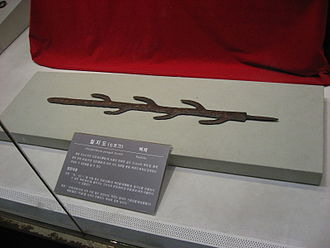
Inscription:
Black Boxes represent unintelligible letters and bracketed ones ambiguous.
First side: 泰■四年十(一)月十六日丙午正陽造百錬(銕)七支刀(出)辟百兵宜供供候王■■■■ (作 or 祥)
"At noon on the sixteenth day of the eleventh month [May], fourth year of Tai■, the sword was made of 100 times hardened steel. Using the sword repels 100 enemy soldiers [Appropriate for the polite duke lord] It is sent [bestowed] to the duke lord. (Manufactured by or good fortune to...) [ ]"
Second Side: 先世以來未有此刀百濟王世(子)奇生聖音故爲倭王旨造傳示後世
"Never before has there been such a blade. The crown prince of the king of Baekje, who lives under august sounds, had this sword made for King of Wa in the hope that it might be passed on to later generations."
It is mentioned in the biograhpy of ""Empress Jingū" and the passage translates to -
(52nd year, Autumn, 9th month 10th day. Kutyo and others came along with Chikuma Nagahiko) and presented a seven-branched sword and a seven-little-one-mirror, with various other objects of great value. They addressed the Empress, saying :-"West of thy servants' country there is a river-source which issues from Mount Cholsan in Kong-na. It is distant seven days' journey. It need not be approached, but one should drink of this water, and so having gotten the iron of this mountain, wait upon the sage Court for all ages.
It also has a various amount of appearances in popular culture and games with it most famously appearing in the final fantasy games under the name "Nanatsusayanotachi" and the 1989 NES game called Demon Sword where the protagonist's unnamed weapon is exactly the sword.

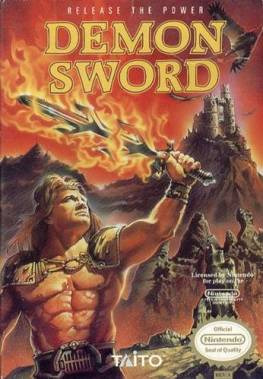
The 3 kingdoms
The 3 Kingdoms era of ancient Korea was a called this due to the peninsula being dominated by the 3 kingdoms ok Baekje, Gorguryeo and Silla, there was also another entity at the southern tip of the peninsula called the Gaya Confederacy.
Silla
Silla was a korean kingdom was a korean kingdom located on the most South Eastern covering land from modern day Busan to at its largest pyeongyang. For all of 586 years the Gyeongju Gim Clan, the Miryang Bak clan for 232 and the Wolseong Seok clan for 172 years. According to Korean records, Silla was founded by Bak Hyeokgeose of Silla in 57 BCE, around present-day Gyeongju. It was said that Hyeokgeose was hatched by an egg laid by a white horse and when he turned 13 six clans submitted to him as king.
Still today Gyeongju, the capital of Silla is enhabited by countless tombs thaf consist of a stone chamber surrounded by a soil mound
Baekje
Baekje, one of the 3 kingdoms was located along most of the south western coast of the peninsula with it covering land ranging from modern day Seoul to Mokpo and survived for roughly 700 years from 18BC to 660AD. Founded by the son of the largest kingdom Jumong, Onjo started the kingdom in Wiryeseong (Southern Seoul).
Baekje alternately battled and allied with Goguryeo and Silla as the three kingdoms expanded control over the peninsula. At its peak in the 4th century, Baekje controlled most of the western Korean peninsula, as far north as Pyongyang, and may have even held territories in China, such as in Liaoxi this thrusting it to be a massive maritime and trading powerhouse.

It was mostly composed of the native, Koreanic Yemaek, people from the Lelang Commandery (a north-western part of the peninsula) that mainly came through via trade and conquest and finally a few Jin.
In 660 the kingdom of Silla, Allied with Tang (A huge Chinese Dynasty) and the largest kingdom, Goguryeo attacked Baekje and took Sabi, the capital, almost immediately absolutely outmanning General Gyebaek army and annexing the country. Shortly after the kingdoms court ladies and concubines all committed suicide by jumping of cliffs, an event and location still commemorated to this day referred to as the “Rock of the Falling Flowers”.
0 notes
Text
This is my first blog-post and it is about some of the books I read between year 7 and 11 in my German high school. These books aren’t in a particular order, I just wrote all of them down and took some notes to guide me along. I’ll give a brief summary and then my thoughts about the books.
Without further due, let’s get into the series!
Nr. 1 “Hexen in der Stadt-Ingeborg Engelhardt”
We read this book in seventh grade and immediately after reading (actually during reading as well) we asked ourselves how and why someone thought “Hell yeah, that’s a topic for 11 year olds” since the book is originally listed for grade 5 and 6.
The story takes place in a German town during the Thirty years war, the witch hunts are running wild and the church is all over the place. The story follows a family of four who live in this town, the father is a doctor, one daughter is read-headed and the other a sleep walker. And although the father is greatly needed in this time, the towns people are really suspicious of the family, and they have to flee the city.
First of all, the book was so dense, it was almost unbearable. Definitely not something for children and yet the book won the “Youth literature award” in Germany, so I guess it wasn’t too bad after all. I honestly don’t remember a lot from it, I know we watched a horrible movie about it and I also remember that the pacing(?) in the book was weird, because the first 80% or so took reaaaally long to read through and virtually nothing happened and then in the last 20% everything happened all at once and it was just too much.
Nr. 2 “Am kürzeren Ende der Sonnenallee-Thomas Brussig”
The only (apparent) reason why we read this book was because we had our final class trip to Berlin in year 10.
The setting is the DDR, East-Berlin to be precise, somewhere around 1970ish. Our protagonist Micha lives in a street which was cut in half my the Berlin Wall and he, unfortunately enough, lives in East-Berlin. He frequent meets with his friends in a nearby park where they listen to West-Music and swoon about Miriam, the neighborhood beauty who is kinda a not-like-other-girls-girl.
All in all, the books is about searching happiness and thinking about how it is so very close and yet never being able to reach it.
It was comfortable to read and overall it was an okay novel. I don’t remember much about it, although I literally read it a year ago. The insight about east-Berlin was cool, and the author definitely implemented own experiences and as someone who grew up in post-split Westgermany it was rather informative and interesting. The quote on the back of the book was also pretty.
“Happy people have a bad memory and rich memoirs”
Nr. 3 “Frühlings Erwachen-Frank Wendekind”
(Springs Awakening)
Oh. My. God. This whole topic was such a BS and I hated every second of it.
The book takes place, once again, in a German Town in a time where there is no Sex-Ed, aka 1900th century, which is also the topic of the book; Sex-Ed gone wrong. Our first protagonist Wendla grows up in a home with a loving, strict mother and far, far away from everything unholy like sex. Our second protagonist, Melchior, is a really smart, really handsome boy who is the top of his class and who likes to read provocative literature which makes him think about masturbation. His best friend is also handsome but really stupid but the social pressure keeps him from dropping out of school- that and his strict, abusive father. Melchior and Wendla fall in love (he hits her with sticks after she metions that she has never been hurt before), have Sex(he rapes her) and after Wendla gets pregnant and dies after an attempted abortion via poisonous plants her aunt have her, Melchior is only mildly devastated. He turns sad, and kinda crazy, after his best friend commits suicide. He has a rendez-vous with the ghost and death itself, he is happy again? I dunno, the whole book was all over the place.
Worse than the book was the discussions we had in class afterwards. One time we had to argue whether it was in-fact rape or if it was just sex. Second discussion we had was about Wendla being a masochist.
The worst thing about the whole topic was the stupid ass movie adaptation.
You think Percy Jackson has it bad? Oh boy. Ohhh boy. The movie plays in the 2000s, graffiti, cool skater boys, rapper-wannabes and early 2000s fashion included. The names stayed tho, cause why not name the male protagonist Melchior in 2001. There are scenes where teenagers, TEENAGERS, go to a brothel. Ah, I forgot.
They are 13-14, book and movie alike.
10/10 would NOT recommend.
Nr. 4 “Der Besuch der alten Dame-Friedrich Dürrenmatt”
(The visit)
(No, not the horror movie)
Oh my goodness, I loved this book.
Picture this. A small town in a German province far away from any major cities with a single trail connection between Hambourg and Zurich, aka the whole length of Germany, where virtually nothing happens. One day, a former resident, comes for a visit. But not just anyone, Claire frikking Zachanassian comes for a visit.
And for blood, because this sixty-something, badass multi-billionaire who got her fortune by marrying a bunch of men who died coincidentally one after the other proposes to the town an offer.
One billion for the head of the man, Alfred the third, who expelled her out of the town after getting her pregnant and lying about it in court after she sued him.
They sent her away in the train, called her a hoe and laughed about her. She lived in a brother for a little while, her son died, and a horny, rich man decided to marry her because why not.
At first the towns people are disgusted by the offer, outraged by the immoral offer and they straight up deny it. “I’ll wait, Claire says”.
You see, the town is really, really poor. Not only because it is in a terrible location commercially wise, but also because Claire bought every factory in the town and brought them all to a stand still to slowly dry the city out. She planned this revenge.
And you see, the proposal of 500 million split between the inhabitants and 500 million for the industry of the city sounds great if you are on the brink of disaster and hunger and misery. But surely, with such an immoral offer, no one would want to commit a crime? Or would they.
Because, now that I look at it, Alfred really did something horrible… maybe, just maybe I can allow myself to stack up some dept.
And Alfred grew more and more paranoid. Begging Claire to stop this, apologizing on his knees, crying and sleeping with one open eye at all times.
We discussed in our class what we would do. We didn’t really came to a conclusion since we had nothing to compare, not one of us was ever asked to make such a decision. “It depends” was our final answer.
They do kill him in the end. It doesn’t end happy, Claire isn’t happy, but she does give the towns people their money. I really enjoyed reading this book. The female “antagonist” was refreshingly bad-ass and the moral despair was entertaining to read.
We learn that Claire is rich and powerful, but that she lost so much innocence, so much energy to enjoy her life in such young years that, as a reader, you cannot not sympathize with her.
Nr. 5 “Das Versprechen-Friedrich Dürrenmatt”
(The pledge)
Hands down the best book I’ve read in school.
This book is originally a critique by Dürrenmatt about the emerging detective novel genre where everything always works out.
The setting is in a Swiss town, 1950ish, and in the beginning the reader takes on the role of an author who meets a certain Dr. H who works for the police. They become friends and take a ride through the mountains. Upon taking a stop at a gas station, Dr. H introduces us to a seemingly old, smoking, alcohol-reeking man and a scruffy looking girl. The narrator is confused, asks who these people are, and back in the car, we learn that this is the former detective, no-one-escapes-me, super-brain Matthäi.
From that point on the narrator switches and we are now in a third person narrator perspective.
Matthäi is introduced again, this happening in the past, as a hard-working, clean, structured man who doesn’t smoke, drink or disobeys rules. No one really likes him in the office, but they value that he just so good at his job. But because he is so unapproachable, they want to sent him away to Jordan.
The week he was planning to travel there, a young girl is raped and then brutally murdered in a small town nearby. And because he is Mister Superbrain, he goes there to help investigate.
The other officers at the crime scene are (understandably) uncomfortable, they don’t want to talk to the family, or the people there in general. So Matthäi talks to everyone. He is a very calm, collected, cold man. So he meets with the family, tells them what happened to their daughter and is utterly, completely shocked when the mother just blankly stares in his face, and asks him to promise her to find the murderer of her daughter. He is shocked by the lack of emotion in this moment and sees himself in this cold visage of the mother. He promises her, just to get away from her as fast as possible, and drives back to be office.
I don’t want to spoil too much because this book is just so good, but oh my god
I’m in general a sucker for drastic changes in character or demeanor (hence why I liked The Visit so much as well) but his book takes everything to another level. They “plottwist” is so incredibly frustrating and nerve wraking to read, the perspective changes provide so much more depth.
And for the first time I finally read a really intricate, morally gray character.
Nr. 6 “Nathan der Weise-G. E. Lessing”
(Nathan the Wise)
This book was kinda eh. If I had so summarize it as fast as possible it would probably be “Religion and accidental incest”. It is about the three world religions and stereotypes between them, about genocide and also about stigmatization. It ends on a nice note, tho.
The only really remarkable passage of this book is the so-called “Ringparabel” in which Nathan answers to the question which religion is the real, big OG of them all. It is pretty nice and the symbolism is really fitting as well. The beginning of the book is incredibly boring but it does get better in the end. All in all not a total waste of time and money but nothing I would read again.
Nr. 7 “Die Leiden des jungen Werther- Goethe”
(The sorrows of young Werther)
Ah yes, no German class without Goethe. This book is written in a way that lets the reader really seep into Werthers emotion because it is written as a letter-novel. Werther is a young, nature-loving guy who (in the beginning of the book) is just really happy, go-lucky and over all nice. Then he meets Lotte, a young, pretty, smart and book-loving woman who is empathic to all those around her. He falls in love with her, despite knowing that she is literally engaged and about to marry. She knows he loves her, her fiance know he loves her and literally everyone knows he loves her and they are ok with it? I dunno. Werther has a severe Seasonal-affective-Disorder. He kinda makes it through the first winter after meeting Lotte but never really recovers, even during summer. In the second winter, he can’t take it anymore and he commits suicide.
I liked the book (not only because I can identify with the SAD). In the end we learn that Lotte isn’t as good as we originally think she is; She is actually really possessive of Werther and although she wants him to be happy, she doesn’t think anyone is good enough for him and thus he should just stay close to her. She enjoys the attention given by her husband, who is actually really nice and whom she does love, and by Werther who is utterly and completely obsessed with her.
Opinions on this book split 50/50 with my friends. Some of them think like me and they see the heart break and the desire to move on but ultimately, the way attraction is so so strong. Some other friends, more specifically my Help-with-Maths-Go-to-Guy hated this book with a burning passion. I can see why. The imagery is sometimes a tad too far-fetched and the wording is, in true Goethe-Fashion really hard to read and the sentences are kinda messed up as well.
But in the end it is still the book which opened the way for Goethe to be one of the greatest writers in Europe and I can see why.
Oh wow. This concludes all the books I read thus far. There will be definitely more to come next year and maybe I’ll do another post like this once I read some more.
I hope you enjoyed to read my thoughts and maybe felt inspired to look into one of these as well!
See you soon!
#books#german highschool#goethe#durrenmatt#my thoughts and opinions#we read more but these are the ones i recall best
2 notes
·
View notes
Text
mcarfield fic (reunion)

So I was actually wanting to write something like this before this prompt came in, so I just sort of flung myself at it. Thank you! <3
(ALSO, I’D JUST LIKE TO SAY THAT “YOU’D BETTER TURN UP, MR. FLUFFLES” IS SUCH A GREAT LINE, I’M HAPPY TO HAVE WRITTEN IT, BYE)
_________
Afterwards, James goes back to Scotland, and Andrew goes to Central America.
James is fully prepared for that to be that, he’s completely braced to move on with his life, to be a professional and get a fucking grip.
Instead, Andrew texts him a selfie of himself holding a sloth. I’m holding a sloth! the text reads. This is Daisy, we’re in love.
The sloth is wrapped completely around Andrew’s shoulders, clinging to him like a tree, and Andrew looks a bit frightened.
I’m very happy for you both, James texts back. I expect a wedding invite.
I’m going to name you best man, Andrew replies. Just no shagging the bridal party.
No schtupping anyone but the groom, James responds.
You’re going to fight Daisy for me? I don’t know if you’ll win, these toes are no joke.
I’ve got a two-year head start on her, James replies. You’re all mine. And he can’t stop smiling, even though this is all ridiculous and dangerous and he knows better, god he knows better.
Andrew sends him a sparkly heart emoji. James doesn’t reply, because James is practicing self-preservation.
But he does send Andrew a selfie with a cow a day later.
This is Pike, he says. We’re not in love, but we have been engaging in some highly immoral eyefucking.
Slag, Andrew replies. I bet you’re just eyefucking your way through the fauna of Scotland.
You left me for a sloth, I’m on the rebound, James replies with an upside-down face.
Poor baby, Andrew answers. I’ll make it up to you.
Tease. There you go, toying with my heart, just like always.
No teasing here.
So you say! I’ve been burned and now I’m on to you.
So let me show you. When are you coming back to New York?
I’ve got some shitty banquet next month, I was on the fence about it but they wanted me to give some sort of speech.
Oh, I got that invite, too. Brits on Broadway? with an eyeroll.
This sort of thing must get exhausting for you.
Depends on the company.
Is that a hint I should go? Keep you from being bored?
You always keep me from being bored.
Andrew, a stuffed bunny and a set of wooden blocks could keep you from being bored.
Then you’d better turn up, Mr. Fluffles, Andrew replies, with a joy-crying emoji tossed in.
And so, three weeks later, on a night hotter than any August night should be, James finds himself once again in the hellmouth of New York City, still inexplicably at his month-to-month lease above Times Square, still telling himself he’s not going to be staying in New York even though his agent is turning away pleas for auditions and screen tests and he’s suddenly overwhelmed with choice in a way he’s never been in London.
Maybe he’s just gotten really skilled at denial. He’s not staying in New York (he is), he’s not flirting shamelessly with Andrew (he is), he’s not getting closer and closer to losing his heart after guarding it fiercely for the last two years against the constant onslaught of Andrew’s mouth and hands and his puppy-dog eyes and his incessant casual intimacy. (He’s so fucked.)
It doesn’t help that Andrew has continually asked him if he’s coming to the banquet, even after James has assured him he is. What are you wearing?Andrew texts him, conveniently as James is staring dubiously at his wardrobe contemplating what to wear the following night. Are you wearing blue? You always wear blue.
Navy, James replies. Why, are you worried we might wind up wearing the same suit?
Maybe I just want us to match.
His and hers dinner jackets, I like it.
My bowtie, your pocket square.
Your kinks are a bit on the nerdy side, has anyone ever told you
You, actually, quite frequently.
Apparently I haven’t gotten my point across.
Well, it’s always been hard to concentrate, I’m too busy ogling your pocket square.
And James doesn’t know what to do with that, just like he never knows what to do when Andrew toes the line of their flirtation right up against the edge of plausible deniability; so he does what he always does and retreats.
Or at least, he tries to retreat.
Should I leave the pocket square at home? He replies, cry-laughing.
Just bring you, Andrew replies, with a heart emoji. Can’t wait.
You can’t possibly be missing me already.
I am, Andrew replies, and the simplicity of it makes James’s heart ache a little.
He’s trying to figure out how on earth to reply when Andrew texts again:
Are you bringing a date?
James swallows.
It’s not like James is entirely oblivious. He’s always known how to dance this dance with Andrew, and he’s always thought that his commitment to it, to never letting things go too far or get awkward, is why Andrew has always felt so comfortable pretending like they’re something they’re not. He’s been in the theatre a good long while, after all; he’s seen countless straight boys play this game, and some of them have even played it with him.
But none of them have ever been his boyfriend onstage every night for two years straight; none of them have been… Andrew.
Maybe it’s time to do it, call Andrew’s bluff once and for all.
Yes, he replies.
After a moment longer than necessary, Andrew replies: Oh.
James’ apartment has a grungy view of the water cooler of the building next door, a slice of Carnegie Hall next door, and a sliver of the Billionaire Building down the street. If he squints, he tells himself he can see the Winter Garden, though that’s almost certainly a lie; still, he can see the haze of light pollution that is Times Square, even from here, and he thinks he probably doesn’t appreciate it much, the smarmy glow of it that Andrew always unironically loves, no matter how many times he gets accosted by the Spider-Man cosplayer on 45th.
He thinks this is probably some sort of moment, standing here in his loaner apartment, in this city that still feels so alien even as he grows to love it more with every day — about to forever cross the line that should never have existed to begin with. He’ll cross it, Andrew will back down, and James will be free to move on and tuck his heart away without, hopefully, too much lasting damage.
James types out, and sends: You. I’m taking you as my date, if you’ll have me.
He’s not sure what he’s expecting, but it’s not for his phone to actually ring a few seconds later.
James nearly drops his phone. “Andrew,” he says, startled.
“Hi,” Andrew says. “Are you serious?”
“Are you serious?” James asks.
“Oh, hell, yes,” says Andrew. “Do you want to pick me up before or just meet at the hotel?”
“No, I mean,” James starts, and then halts. Just ask, he orders himself.
“I want to meet you at the hotel,” Andrew says. “Get a glimpse of you in your tuxedo, meet your eyes across a crowded room.”
“So we’re really doing this,” James repeats, blankly.
“Text me a photo of your pocket square,” Andrew says, and hangs up.
James is… honestly, James has no idea what to expect, but he dutifully texts Andrew his pocket square — patterned, burnt orange, with a touch of lavender. The next evening, a few hours before the banquet, Andrew texts him back a picture of a gorgeous textured bow tie, unmade and tossed casually on what must be Andrew’s bed, with James’s colors inverted — a deep indigo flecked with light orange. There’s no message with it, but somehow that makes it that much more significant. James stares at it for a long time, trying and failing to read whimsy into the gesture.
He can’t, though. He only sees promise; intent. It makes him shiver, makes him feel nervous and keyed-up and on edge — the kind of jittery anticipation normally reserved for an opening-night performance.
He should probably be thinking of this as a performance, instead of something real. That’s how he’s gotten through the entirety of his relationship with Andrew until now. There’s no indication tonight will be any different.
Except then Andrew steps into the Marriott wearing the most gorgeous grey suit James has ever seen, and he’s wearing the fucking bow tie, and his hair is just sort of artfully everywhere, and he looks around and sees James across the lobby, and James thinks, across a crowded room, and his lungs constricts, and he honestly doesn’t know how he’s going to do this if it’s not real.
Andrew beelines to James past a litany of people calling his name, and James hasn’t thought this moment through at all, which he suddenly realizes was a horrible mistake, because, like, does he go for the manly shoulder-hug, a brief waist-wrap, the casual cheek-kiss, or—
“Hey,” Andrew says, eyes bright and intent on James’s face, and he slings his arms around James’s neck just like he’s done countless times onstage. James puts his hands on Andrew’s waist without a second thought for anything, except to marvel at how endlessly unprepared he is for how tiny Andrew is, even after all this time.
“Hi,” he rasps, and the urge to pull Andrew closer is irresistible, so he does. Andrew cups the back of James’ head and leans in, close.
“You look incredible,” he says. He tilts his head forward, and James thinks for a lightning-flash that they’re about to kiss, but Andrew just hovers there, close and intimate, eyes locked on his face.
“I like the tie,” James replies, reaching up to run his hand over it — only that’s a mistake, because it’s too intimate, it’s too much, it’s—
Andrew settles against him, chest to chest, and says, “I missed you,” and then moves in to kiss James on the mouth.
James’ eyes flutter shut, and he kisses back, and there are cameras going off all around them, and he should be used to that, but there are also fireworks exploding behind his eyes, and his heart is hammering, and he pulls back to try and read Andrew’s expression, only to find Andrew looking at him with that hooded and inscrutable look he gets sometimes — eyes dark, not quite frowning, gentle but opaque.
“I definitely missed that,” James murmurs. Andrew’s eyes flash, and James is definitely not going to kiss him again, so instead he finds Andrew’s hand and lifts it to his lips — another mistake, because that turns out to be almost as intimate as if they had kissed again. He knows how they must look, how all this must look.
“Let’s talk inside,” he says, still in an undertone, because he’s under some kind of spell and doesn’t want to break it. He tugs Andrew up the escalator to the ballroom level, away from the public and toward the banquet; but Andrew laces their fingers together and leads him away from the party altogether, towards an alcove around the corner where currently no one is mingling.
Once there, he pushes James into the corner and runs his hand over James’ cheek, thumbing the curve of his jawline. He smiles a little as he drags his fingertips through James’s scruff, like he’s missed that, too.
“I don’t want to go in just yet,” he says, resuming his slow-dance position with his arms curled around James’s neck. “I want to hear how your vacation went.”
“I didn’t elope with any sloths,” James informs him, reaching up to thumb the back of Andrew’s neck, because he loved doing that during their dance and it always made Andrew shiver. He shivers now, and James grins, a little smug, but mostly besotted, aware he probably looks it.
“Daisy was very sad to see me go,” Andrew says. “Although I think she probably knew it was time.”
“Your fast-paced lifestyle was too much for her, was it?” James asks. Andrew giggles and beams at him.
“Plus, I had a guy back home,” he says.
“Oh, really.” James wonders if he could get away with trailing his fingers over Andrew’s collarbone, over the adorable dint in his chin that he’s fantasized about kissing so often. Later, he thinks, and is startled to realize there might actually be a later. “Must be a pretty lucky lad.”
“He is,” Andrew says, smirking. “He’s an extraordinary actor and he has something of a fetish for the color blue that I don’t quite understand, but which I have developed a deep appreciation for, nonetheless.”
“Oh, that,” James laughs. “Brings out his eyes, that’s all.”
Andrew swallows and looks a bit nervous for the first time since he walked in. “I may have spent an inordinate amount of time thinking about those eyes over the past couple of weeks.”
“You should have said something,” James murmurs. “I’d’ve come back before now, if I’d known.”
Andrew blinks. “I was trying to say something,” he says, perhaps a bit guiltily. “I thought I was shameless.”
James laughs despite his reddening cheeks and leans up to kiss Andrew on the forehead.
“You’re always shameless,” he says. “I wasn’t sure if it was all just…” he takes a deep breath. “More of the performance.”
Andrew winces. “I know,” he whispers. “I’m sorry. I wasn’t sure how I felt until I was away from you, and then all I could think about was, was this.” He cups James’ face in his hand and leans in to kiss him again, and this time it’s deep and sweet, without any of the confused urgency of the previous kiss, and James parts Andrew’s lips with his own and culls a soft moan from Andrew, precious and world-shattering and perfect.
“Are you sure?” he asks, burying the question against the side of Andrew’s throat. “I can’t go back to this all being some sort of game, Andrew, it’s too much.”
Andrew turns and takes James’s face in his hands and looks at him with one of those burning earnest expressions that always makes James feel like his heart is going to float out of his chest for wanting him, for wanting him just like this, earnest and needy and honest and raw.
“It was never a game, with you,” Andrew says, eyes fixed on his. “It wasn’t, I just was so afraid I would turn out to be wrong, and I wanted to be sure before I—”
“I know,” James says, because he does, he knows from every single night, every wordless communication they’ve ever had over the last two years. “I know.”
He kisses Andrew again, gently, even though he knows, objectively, that Andrew isn’t fragile, not really, that inside he’s steely and determined and far savvier than he gets credit for being. Still, James always has an ingrained urge to handle him with care, to keep him safe.
Andrew sways into him. “It took time to be sure,” he says. “And I took the time, and now I’m sure.”
And James’s heart does float out of his chest, finally, up and out and right into Andrew’s hands.
They make out for a few minutes, until Andrew’s hair is even more artfully disheveled, until his lips are deliciously swollen and James is starting to think perhaps they should just skip the banquet altogether and grab a discreet room upstairs.
“Aren’t you nominated for something at this thing?” Andrew murmurs against James’s lips. “You probably should be there for it.”
James makes a fully noncommittal noise and resumes kissing the underside of Andrew’s jaw.
Andrew laughs, soft and amused. “Take me inside and let’s scandalize everyone,” he says.
“Are we scandalous?” James asks.
Andrew grins. “That depends. Are we casual? Are we serious?”
James laughs. “No offense,” he says, “but I feel like we’ve spent the last two years in a very serious relationship, and I would really like to try the casual thing for a bit before we ramp back up.”
“We can do casual,” Andrew says, his grin getting larger. “But just so we’re clear, I’m still gonna make out with you when you win your award.”
“That’s good,” James says. “Casual should definitely involve makeouts.”
“And a lot of very intense feelings we mutually acknowledge but never talk about,” Andrew adds.
James pulls back, takes Andrew’s hands in his, and looks at him for a long moment.
“We’ll have time to talk about all of it,” he says at last. “Feelings, the future, everything. I’m not going anywhere.”
Andrew’s smile somehow gains more wattage than ever. I did that, James thinks, and bites his lip to keep from grinning so hard he looks ridiculous.
“I’m not letting you go,” Andrew says, kissing James sweetly.
And then he tugs James, hand in hand, into the ballroom, and into his new, delightfully scandalous life.
3 notes
·
View notes
Video
youtube
(via Republicans' Vicious and Immoral Health Care Bill Is Just Part of a Sinister Long Game | Alternet)
The GOP is employing a strategy developed by Machiavelli and perfected by Goebbels.
While Democrats are jubilant that the GOP passed a terrible healthcare/tax-cut bill through the House, which they think will cause voters to reject the GOP in 2018, it’s a very, very premature celebration.
The Republicans are playing a longer game here, one based on a time-tested strategy first explicated by Machiavelli and fully put into place by Goebbels in the early 1930s, then fine-tuned by Reagan through the 1980s.
https://youtu.be/SrxH0pSyfho
That strategy is not only one the GOP has successfully used many times in the more recent past, from Nixon’s “secret plan to end the Vietnam war” to Reagan’s “reforms” of tax law, but one that they’re clearly betting will continue to work for them (particularly with the help of Fox and right-wing hate radio).
Step one is to use the classic Goebbels “Big Lie” technique. That was on full display in the White House PR stunt after the House vote – lie about lowering premiums, lie about expanding availability, lie about preexisting conditions, lie about how Obamacare is “failing.” (Think Bush with Iraq, or the “Clear Skies Initiative,” etc.)
And, to make sure it sticks, Trump had Republican after Republican step up to the microphone and explicitly and clearly repeat the Big Lies.
Step two then becomes clear. The bill goes to the Senate and no matter what happens there, complain that it’s being “watered down.”
This sets up the perfect next part of the Goebbels/Machiavelli strategy – claim victimhood, and place blame on those awful (and often racially different from all those white people at the White House ceremony) Democrats.
Because the Senate prevents some of the true horrors of the House GOP’s plan from going into law, GOP voters don’t realize (and Fox will never tell them) that it was really all just a hustle to satisfy the GOP billionaire donor class.
And, because of the Big Lie, every good thing that’s still in Obamacare is thought, by Republican voters, to be the result of GOP efforts, as they now “own” health care. At the same time, they’ll claim that Democratic obstruction is why whatever “bad” things happen happened. (And Drudge, et al, will be sure to find some horror stories in the fall of 2018.)
Step three happens in 2018 – go after every Democrat running for the House or Senate for “obstructing Republican improvements and progress” on healthcare. It’s another Big Lie, but, like Reagan’s Big Lies about the evils of unions, the benefits of trickle-down economics, the urgency of exploding privatization of the military, not raising the SS retirement age, etc., it’ll be believed by enough people to hold onto the House and Senate.
The proof that this strategy could work in this case is that it’s already being used – with success – to obscure the true reason Republicans are trying so hard to “repeal and replace” Obamacare.
Here’s what’s really driving the GOP: The subsidies for middle class workers in Obamacare are largely funded by an almost 3 percent tax increase on capital gains income (and a small increase on the ordinary incomes of people in the top 1 percent).
This special 20 percent maximum capital gains tax rate is available only to people who “earn” their money with money/investments (rather than working and drawing a paycheck), and, thus, is almost exclusively paid at the full 20 percent rate only by the very, very, very rich. And that 3.8 percent top-end rate addition was a functional almost-15 percent tax increase on most billionaires.
They are not happy and they fund the GOP and its various corporate media propaganda arms.
But because the corporate media won’t explain this (“it would seem partisan to point out facts inconvenient to Republicans,” they whine), most Americans don’t realize that the whole “health care debate” has little to do with health care – it’s really about cutting that 15 percent increased Obamacare tax on top-end capital gains income.
But because Republicans keep repeating the Big Lie that they’re trying to get “more and better and cheaper” health care to Americans, most Americans don’t realize it’s really about a tax cut for the GOP donor class.
read more @ the link
1 note
·
View note
Photo
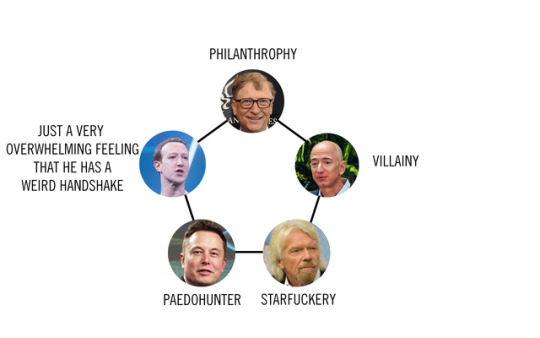
New Post has been published on https://shovelnews.com/how-much-money-do-you-have-to-earn-before-you-get-weird/
How Much Money Do You Have to Earn Before You Get Weird?
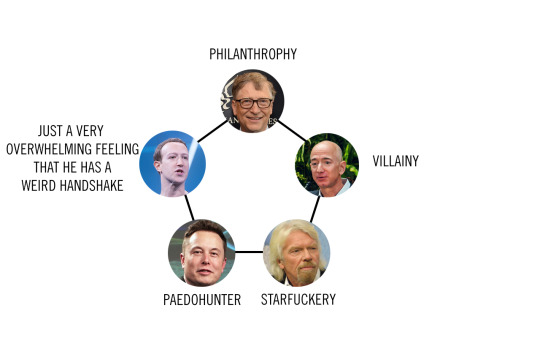
This article originally appeared on VICE UK.
Who is your favorite billionaire? Wrong answer: Being a billionaire is a fundamentally immoral thing to be and all of them should be slaughtered, their blood drained from their bodies, and their heavy heads placed on spikes. But ignoring that: Who is your favorite billionaire? If it’s not Elon Musk, you’re doing billionaire fandom wrong. And I’m not talking in that Rick-and-Morty-poster, le-epic-win–style way of enjoying Elon Musk: Enjoying him as a spectacle, as a projection of who you would be if you were rich, that’s the way to do it. Think about it, if you were a billionaire, would you be Bill Gates (philanthropist, still fundamentally looks like he gets wedgied now and again)? Jeff Bezos (unapologetically rich hench dude, first villain to get grenade exploded in an Expendables film)? Mark Zuckerberg (a grey t-shirt that got a bit carried away and an alien who has to actively remind himself to blink)? Richard Branson (“Mommy, why is that dinner lady suing the NHS?”)? Or would you be Elon Musk, who keeps trying to send shit into space and occasionally summons a beautiful woman from the world of celebrity to come and be his blonde concubine? Elon Musk is so rich he called a cave diver a pedophile three separate times because he keeps shit talking on Twitter and he knows he’s so rich he’s essentially legally bulletproof. You telling me that’s not you? Because that’s me. You’re telling me that’s not you? That is me if I ever get rich. So Lord help you all if I ever get rich.
Here’s an example of how Elon Musk is exactly you if you were rich. A couple weeks ago he smoked a joint on the Joe Rogan show, which we all know about and remember fondly because he did it with the casual élan of a 13-year-old who just tried to stick his dick in an N64. The next day—for this reason, as well as two executives quitting on the same day and the hangover from Musk tweeting he was taking the company private and a New York Times interview where he started crying—Tesla stock crashed 6%. I have to caveat the next section by saying: I am bad at math.
I am bad at math: a caveat
Listen. I am not good at math. Accepting your flaws and embracing them—working with them, and not against them—is part of growing and becoming a complete human. Numbers are a foreign language to me! I am not good at math. For that reason, I am going to, bafflingly, attempt a ton of maths.
How much did that joint cost Elon Musk?
According to CNBC, as of June, this year Musk owns 33.7 million shares of Tesla. Before he took a massive rip of that fat J, it was trading at $280.95, making his shares worth $9.4 billion. After honking on dank, dank kush, shares went down to $260.32 (making Musk’s shares worth $8.7 billion). A lot of billionaires’ wealth is theoretical—it is tied up in stock, which waxes and wanes as the days progress, or is locked into hard real estate, so their actual money on-hand is a lot less than the total calculation of their worth—but by my calculation, that puff puff pass cost Elon Musk: $695,231,000. To clarify: six hundred and ninety five. Million. Dollars. Sure, maybe your mom caught you with a little bit of weed once and you got mildly in trouble and grounded for a medium length of time. But tell me: Have you ever bong ripped so hard someone’s GDP disappeared? [1]
Musk’s recent behavior (best described as “gloriously erratic”) has made me realize something: Basically every billionaire goes weird, in the end. And that’s got me thinking: Is weirdness inherent to the billionaire-fated mindset, or is weirdness thrust on to the normal human mind when it is exposed to such a ludicrous bank balance? Are billionaires billionaires because they’re weird, or are they weird because they’re billionaires? Or, to put it another way:
What is the exact amount of money I have to have before I go insane?
I intend to investigate that.
The billionaires
I have spent a very substantial amount of time now[2] investigating the historical wealth of the following five billionaires, who all broadly represent one end of the five-point billionaire personality matrix:

We will plot first their explosive wealth, then map their historical erratic behavior. I’m then going to put one graph on top of the other and try and figure out the exact net worth you need to have before you start going on podcasts and trapping Azaelia Banks in your house.
A few more caveats: Sometimes it is very difficult to figure a billionaire’s registered net worth in the years between their first mythologizing money-making deal (Richard Branson sold $6,000 worth of advertising in his first magazine, Student, when he was 15; Elon Musk sold a video game for $500 when he was 12) and their first billion because nobody (i.e. Forbes) really pays attention to how much money you have until you have a billion dollars. So there are some gray areas between, like, Mark Zuckerberg’s first million dollars in 2006 and his first billion-and-a-half dollars two years later (nobody knows how much Mark Zuckerberg was worth in 2007). Equally: I have not adjusted for inflation in any way at all because: come on! Boring! Thirdly: all accusations of erratic behavior are purely from me, purely on my own terms. I am the lash and I am the law, the only person saying what’s up is me. And so:
Bill Gates
Wealth: My guy Bill Gates is the vanilla ice cream of billionaires. Microsoft secured a deal worth $50,000 in 1980, when he was a 25-year-old CEO; in 1981, he became a millionaire through Microsoft holdings and the general business the company was doing. Although the exact figure is unclear, he had a rollerskating party in 1985 for his 30th birthday and he got speeding tickets a few times, which was about as wild as he ever got[3]. Then, in 1986, Microsoft’s initial public offering (IPO) went gangbusters and Gates, with at least $350 million in stock to his name, became a headline-making billionaire overnight. He’s basically been the go-to “Richest Man in the World” all the time you’ve been coherent and alive before Bezos took over from him this year.
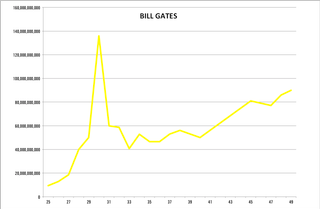
(This is a chart of Bill Gates’ wealth. You will notice his age, written along the X-axis, is wildly incorrect, a running theme throughout this piece. This is because I could not get Excel to change it.)
Mania: In 2006, he announced he was going to start stepping back from Microsoft to focus on philanthropy, and signed the Giving Pledge in 2009 vowing to give away at least half of his wealth over his lifetime. And since then, he’s done nothing too wacky. He put some money into developing Vitamin A-enhanced bananas in 2012? In 2015, he drank a glass of reclaimed toilet water? Like? Nothing he has done is too crazy and most of it is for the wider good of the developing world? Gates is our control billionaire. He’s the most wealth of any man alive, the least signs of deep mania, the noble model of what an impossibly wealthy man should be.

(This is a chart of Bill Gates being weird. Instances of notable weirdness are marked in blue. You will notice there are no instances on this chart.)
Richard Branson
Wealth: Branson started making money in his teens after launching Student magazine and basically turning rival advertisers against each other to secure funding (“I soon learned the art that if I let Coke know that Pepsi were definitely in, that Coke would then jump in. And my education started,” he told CNBC last year. “It was an exciting time.” And the past is a foreign country, clearly, if a 15-year-old can just call Coke up and be like, “alright, money please”). He made his first million at the age of 23 after launching a mail-order record sales business, and then he started chain-launching businesses: he was worth £5 million [$6.5 million] in 1979, made his first billion at 41, and spent the next 18 years making another half a billion to take his net worth higher, then doubled it again the next year. His net worth now hovers around £5 billion [$6.5 billion], making him our poorest and therefore most cucked billionaire.
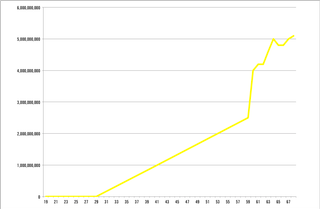
(This is Richard Branson’s wealth. He was the only one whose age I could get to work on it.)
Mania: Oh, Richard Branson is big time a maniac. Big time. I don’t know how old you are but if your age vaguely aligns with mine you might remember a period in the late-90s where basically the only news story, for about four years, was about Richard Branson repeatedly attempting and failing to circumnavigate the globe in a hot air balloon? He just kept crashing into the sea and doing a big OK-sign when the authorities came to rescue him? He tried to launch his own soft drink to rival Coke? In 2004 he started selling tickets to space and still hasn’t honored a single one of them?[4] When he sold Virgin EMI he ran through the streets sobbing? But the high point of Branson’s billionaire mania, the tipping point, the exact moment he cracked in a way he could never be glued back together again was when, shaven-faced and beaming, he donned a bridal gown for a doomed business called “Virgin Brides.” This man was worth £1.5 billion [$1.9 billion] at this exact moment in time.
Which gives us a good starting point in our studies: Earning £1.5 billion [$1.9 billion] is bad for you.
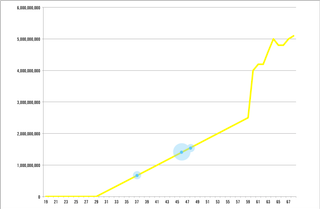
(Branson’s wealth with weirdness—every time he invested in hot air balloons, basically— marked in blue)
Mark Zuckerberg
Wealth: Mark Zuckerberg has done well for a guy who is the crystalline vibe of “spending too long online researching until your back seizes up,” making his first million in 2004 as Facebook started to receive piecemeal outside investment, and he turned it into his first billion two years later when the company hit its 500 shareholder limit and went public. Since then, his wealth has escalated wildly: He’s worth around $60 billion as of right now, today. Like Gates, he’s signed the Giving Pledge and set up various charitable endeavors, but also took the bullet for the Cambridge Analytica thing at the start of the year and did that weird bulgey-eyed water drinking when he was being deposed. He just feels like he’s your cousin’s older boyfriend who is quite boring and just got really into climbing, and he’s wearing a North Face fleece and eating in silence at your family barbecue, only he’s Mark Zuckerberg, and he’s richer than God.
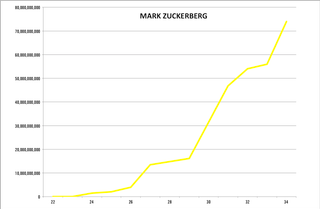
(Think I got his age more-or-less right with this one, actually)
Mania: Mark Zuckerberg’s lack of outward mania is actually what makes him so terrifying—he sort of has the eerie non-personality of an MRA who only eats red meat and reads books about murder —but yeah on the whole he’s not done anything too weird beyond getting repeatedly sued, forever, by everyone. It’s kind of funny that Mark Zuckerberg just quietly wants to live his life, driving a Prius and wearing a ton of zip-up fleeces, collecting every bit of data on every single person alive—and instead, he just keeps repeatedly getting in trouble for being himself. Anyway the high point of him being a maniac was the water-drinking thing, and his net worth was close to it is now when it happened, so I’m saying: Earning $60 billion is bad for you.
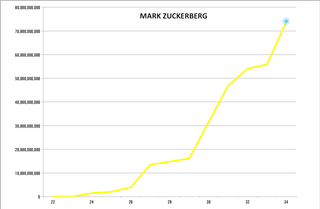
Jeff Bezos
Wealth: Bezos is currently the richest man on the planet and until Amazon Prime stops being so incredibly, annoyingly convenient, that is only going to continue. Early era Bezos was just a properly “reads the whole internet, every day” guy who didn’t know how to buy shirts that fit him, but a few years ago, he did a U-turn and started getting big into arm workouts and wearing padded vests, so he’s possibly the only one of our billionaires to glow-up in any significant way. Anyway, he’s now worth $120 billion and he looks like he can pick you up over his head so sadly the world’s richest nerd is now a Bond villain, meaning we’re all doomed.
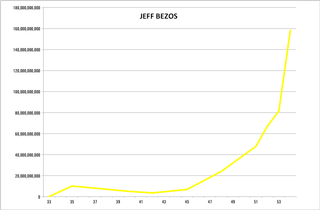
(Yeah got the age right on this one as well. Really… really had a time making these graphs you’re just barely flicking your eyes over, I have to tell you. Have you actually closely read any of these graphs? Of course you haven’t. I wouldn’t, if I were reading this. It’s OK. I understand. It’s just I really did try.)
Mania: If being a billionaire is a fundamentally immoral action then Bezos is the epitome of that because he has enough wealth to hand every Amazon employee $10,000[5] and he’d still be the richest man on the planet, and his empire is built on the backs of hundreds of thousands of warehouse workers who are too afraid to take a pee break in case they get fired or camp in a tent near their workplace to minimize their commute. Like most of our billionaires, he has dabbled in space travel (why does everyone with a net worth of $4 billion or above think they can crack space travel, when NASA, working on it for years, still occasionally fucks it up? Start on flying cars and work your way up.) and is begrudgingly tipping his toe into the waters of philanthropy, but the real billionaire weirdness of him lies in his (undoubtedly successful) leadership qualities and approach to work. Here, from Wikipedia:
Bezos does not schedule early morning meetings and enforces a two pizza rule–a preference for meetings to be small enough to where two pizzas can feed everyone in the board room. [122] When interviewing candidates for jobs at Amazon he has stated he considers three inquiries: Can he admire the person, can the person raise the common standard, and under what circumstances could the person become exemplary? [123]
He meets with Amazon investors for a total of only six hours a year. [122] Instead of using PowerPoints, Bezos requires high-level employees to present information with six-page narratives. [124] Starting in 1998, Bezos publishes an annual letter for Amazon shareholders wherein he frequently refers to five principles: Focus on customers not competitors, take risks for market leadership, facilitate staff morality, build a company culture, and empower people. [125][126]Bezos maintains the email address “[email protected]” as an outlet for customers to reach out to him and the company. [127] Although he does not respond to the emails, he forwards some of them with a question mark in the subject line to executives who attempt to address the issues. [127]
On one hand, that question mark thing is so, so sociopathic and chilling. But on the other hand, the guy who can barely type an e-mail is worth $150 billion. So who’s the real idiot? Once again: it is me.
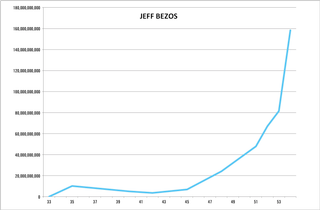
Elon Musk
Wealth: Elon Musk’s wealth is my favorite of the lot because he’s basically just a chain-started nerd businesses and made millions turning to billions with each. His first software company, Zip2, netted him $22 million when it sold in 1999. A month later, he started X.com, which merged with Confinity a year later and became the PayPal we all know and love and use for ill-advised late-night eBay purchases (it sold for $1.5 billion in 2002: Musk made $180 million). Following the sale, he smooshed everything into three businesses—SpaceX, the world’s most expensive ego massage, an airspace company with designs on occupying Mars; Tesla, an electric car company that is statistically massive despite nobody you know seeming to own or drive one; and SolarCity, a solar energy company HQ’d in California. At the time of the three investments, Musk is on record saying he had to borrow money to pay rent: now he’s worth $20 billion and he’s shot a Tesla into space. Yeah? What have you ever done?
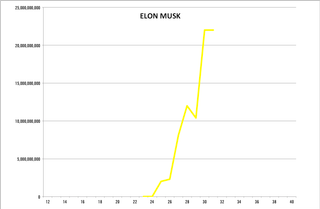
(His age is just completely fucked on this one.)
Mania: Elon Musk’s mania is my favorite of the bunch because it’s come to the surface this year—he started going out with Grimes, he invited Azealia Banks over to his house to watch him tweet, he keeps crashing his own stock by doing aforementioned tweeting, he tripled-down on calling a Thai-based cave diver a pedophile, he smoked weed on a podcast, he shot a car into space. His net worth this year is hovering around $20 billion despite all the times he gets high, he starts crying or calls someone a nonce, so it’s safe to say that: Earning $20 billion is bad for you.
But did the bizarreness start earlier than this? If you read the 2010 Marie Claire story where he double-fists ice cream cones and threatens to fire his wife, you might think: yes. In 2001, after Musk left PayPal, he got slightly too into the idea of firing a ton of mice into space and seeing if they breed up there. From 2017’s Elon Musk: Tesla, SpaceX, and the Quest for a Fantastic Future:
Musk’s friends were not entirely sure what to make of his mental state. He’d lost a tremendous amount of weight fighting off malaria and looked almost skeletal. With little prompting, Musk would start expounding on his desire to do something meaningful with his life—something lasting. His next move had to be either in solar or in space. “He said, ‘The logical thing to happen next is solar, but I can’t figure out how to make any money out of it,’” said George Zachary, the investor and close friend of Musk’s, recalling a lunch date at the time. “Then he started talking about space, and I thought he meant office space like a real estate play.” Musk had actually started thinking bigger than the Mars Society. Rather than send a few mice into Earth’s orbit, Musk wanted to send them to Mars. Some very rough calculations done at the time suggested that the journey would cost $15 million. “He asked if I thought that was crazy,” Zachary said. “I asked, ‘Do the mice come back? Because, if they don’t, yeah, most people will think that’s crazy.’” As it turned out, the mice were not only meant to go to Mars and come back but were also meant to procreate along the way, during a journey that would take months. Jeff Skoll, another one of Musk’s friends who made a fortune at eBay, pointed out that the fornicating mice would need a hell of a lot of cheese and bought Musk a giant wheel of Le Brouère, a type of Gruyère.
At this point, he was worth an estimated $165 million. My guy got so rich he tried to emulate biker mice from mars. Takeaway: Earning $165 million is bad for you.
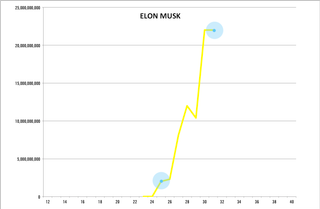
(Weirdness marked in blue: at $165 million, with the mice, and at $22 billion, with the Grimes and the weed.)
Conclusion
Bill Gates and Jeff Bezos cancel each other out: Gates has been monstrously rich for 30+ years and never done anything weird, and Bezos has been monstrously rich for 20 years and has always been sort of background-hum weird. They are two opposite forces of billionaire weirdness that negate each other to meet in the middle at true neutrality. Mark Zuckerberg is fundamentally odd, but has not ever done anything psychotic enough to be interesting, but as our youngest billionaire, he has time and money on his side (remember when that guy who did #StopKony took all his clothes off and masturbated near some parked cars? I feel like we have something like this in Zuckerberg’s future. Keeps doing press conferences while solemnly holding an AK, for example. Decides to launch a career in pro wrestling and gets slammed to death by Ric Flair with one final, terminal “woo!” Runs for president). This leaves us with two full-on billionaire weirdos: Elon Musk, who made $165 million and tried to fire a tub full of mice into space, and Richard Branson, who went very peculiar in the ‘90s and thought he could dick on Coke. So seeing as they went weird at $165 million and $1.5 billion, we can split the difference and say that this amount of money will send you bananas:
$832,500,000
So try not to ever earn that. Thanks.
[1] Stock being stock, it has since climbed back to $280, so Musk has made his money back. I only put in this horrendously sterile, water-carrying footnote to fend off very tedious “well actually…” replies I’m going to get from people on Reddit and Twitter.
[2] This is a bad idea because now the concept of money means very little to me. Example: In 2002, Elon Musk sold PayPal to eBay, and the value of his stock made him $165 million. In my head, having investigated billionaires all week, I am reading that figure and thinking: Pathetic. What a pathetic number. Try making some real money, 2002-era Elon Musk. Do you understand how in my overdraft I am! Do you realize how much I spent on Ubers this weekend now that I think $165 million is an insignificant amount of money! I have broken my head!
[3] From a 1986 profile I cannot believe I read: “Oddly, Gates is something of a ladies’ man and a fiendishly fast driver who has racked up speeding tickets even in the sluggish Mercedes diesel he bought to restrain himself.” I just really cannot imagine Bill Gates as a ladies’ man, sorry. I know we’re meant to be building him up. But come on.
[4] Though quite why you’d trust a man who can’t even fly a balloon around the planet without crashing it into the ocean with the task of flying your soft human body into space: I don’t know. A Virgin train can barely get to Edinburgh without stinking of shit about it. No way do I trust that dude with space travel.
[5] As of April 2018, there were 563,100 Amazon employees registered, which at $10,000 a pop would make a hole of $56.3 billion in Bezos’ personal finances, which again he’d probably make back within a year just from me buying spatulas, Command hooks, and books I’m not ever going to get around to reading and having them delivered straight to the office
Sign up for our newsletter to get the best of VICE delivered to your inbox daily.
Follow Joel Golby on Twitter.
Source: https://www.vice.com/en_us/article/wjydmm/how-much-money-do-you-have-to-earn-before-you-get-weird
0 notes